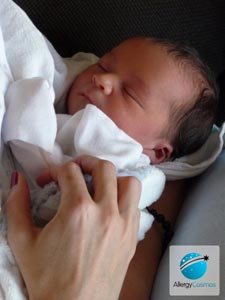If you suffer with asthma, it’s very likely that someone else in your family does too. But what are common asthma causes? It’s long been known that asthma runs in families and about half of this is due to genetic factors and the rest to having a shared environment. Ten years ago researchers on both sides of the Atlantic announced that they had sequenced the human genome. This opened the door to a revolution in medicine which could brighten the prospects of people with chronic diseases like asthma. For instance, we could look forward to a more personalised approach to asthma treatment, where prescriptions would be aligned with the individual’s genetic profile with pinpoint accuracy, so minimising any side effects. We might also expect new and more effective therapies, based on a deeper understanding of the disease based on the genes involved. And a pregnant woman could get an answer to that all-important question ‘Will my baby have asthma too?’ through genetic testing.
So far these promises are a long way from being fulfilled. But there’s steady progress - particularly in the field of asthma - and good reason to be optimistic. Only last month researchers for the Perinatal Risk of Asthma in Infants of Asthmatic Mothers (PRAM) study at Yale School of Public Health announced the discovery of three new genes where particular variants that can increase a child’s risk of developing asthma. But it’s important to realise these are not genes ‘for’ asthma. Unlike single gene disorders, such as cystic fibrosis and haemophilia (where if you have the gene you have the disease), asthma is influenced by many genes (including the three that have just been discovered). You need to inherit a particular pattern of gene mutations to be at increased risk of asthma. The Yale researchers found the three important gene variants in their PRAM children but there are as many as 250 or so genes that researchers have linked as an asthma cause over the past ten years or so. How can we know which ones have any real relevance to people suffering from asthma, or who are at risk of it? The good news is that gene chip technology can now scan a patient sample for variants of several hundred different genes, making it possible to pick out gene patterns that are the signature of not just asthma itself, but all its different subtypes. Of course, we still need to know which are the key gene variants to look for, but the recent discoveries at Yale (and elsewhere) suggest that significant progress is now being made.
Related Pages:




